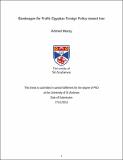Files in this item
Bandwagon for profit : Egyptian foreign policy toward Iran
Item metadata
| dc.contributor.advisor | Hinnebusch, Raymond A. | |
| dc.contributor.author | Morsy, Ahmed | |
| dc.coverage.spatial | 187 p. | en_US |
| dc.date.accessioned | 2018-04-05T15:45:30Z | |
| dc.date.available | 2018-04-05T15:45:30Z | |
| dc.date.issued | 2017-06-20 | |
| dc.identifier.uri | https://hdl.handle.net/10023/13077 | |
| dc.description.abstract | What explains the lack of normalized relations between Egypt and Iran? Despite mutual potential benefits Egypt and Iran could have gained from normalized bilateral relations over the past several decades, a range of factors prevented them from doing so, including personality politics, domestic political and economic considerations, as well as regional and external alliances and competing visions of regional order. Accordingly, the trajectory of modern Egyptian policy toward Iran has been non-linear. Realist and constructivist schools of International Relations theory, on their own, cannot adequately explain how Egypt's foreign policy toward Iran varied from times of hostility, friendship, stagnation, and openness under Presidents Gamal Abdel Nasser, Anwar Sadat, Hosni Mubarak, and Muhammad Morsi. As such, neoclassical realism--with its emphasis on the interaction between geopolitical structural conditions and the roles of leadership and domestic politics in shaping a state's foreign policy--offers the best framework for analyzing Egypt's foreign policy behavior toward Iran. | en_US |
| dc.language.iso | en | en_US |
| dc.publisher | University of St Andrews | |
| dc.subject.lcc | DT82.5I55M7 | |
| dc.subject.lcsh | Egypt--Foreign relations--Iran | en |
| dc.subject.lcsh | Iran--Foreign relations--Egypt | en |
| dc.title | Bandwagon for profit : Egyptian foreign policy toward Iran | en_US |
| dc.type | Thesis | en_US |
| dc.type.qualificationlevel | Doctoral | en_US |
| dc.type.qualificationname | PhD Doctor of Philosophy | en_US |
| dc.publisher.institution | The University of St Andrews | en_US |
This item appears in the following Collection(s)
Items in the St Andrews Research Repository are protected by copyright, with all rights reserved, unless otherwise indicated.

